Wednesday Feb 25, 2026
Wednesday Feb 25, 2026
Thursday, 21 August 2025 03:11 - - {{hitsCtrl.values.hits}}
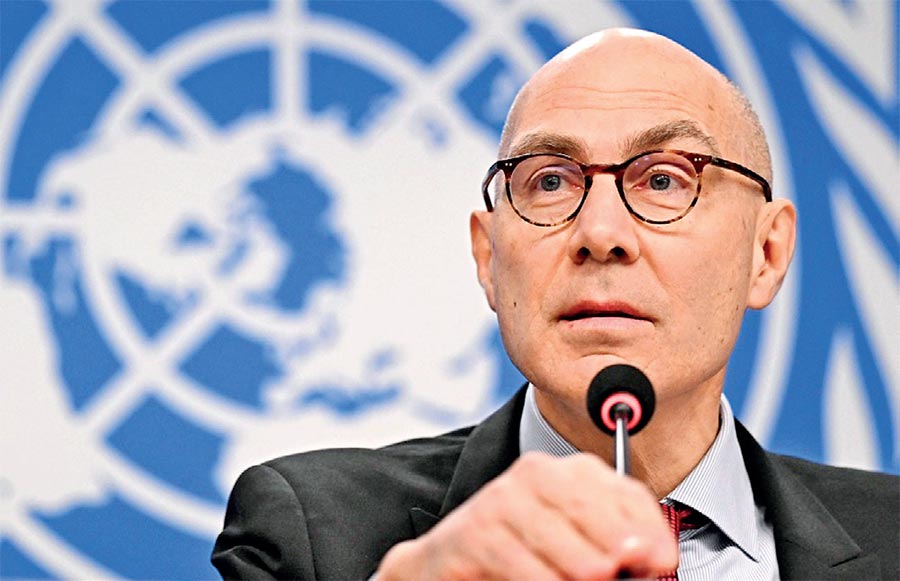
Volker Turk targets SL military, mentions LTTE
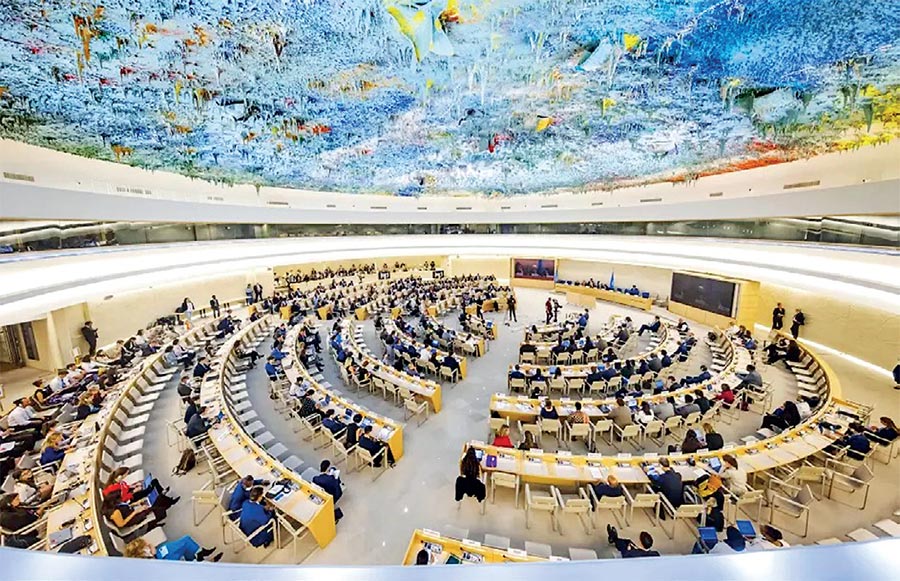
UN Human Rights Council, Geneva
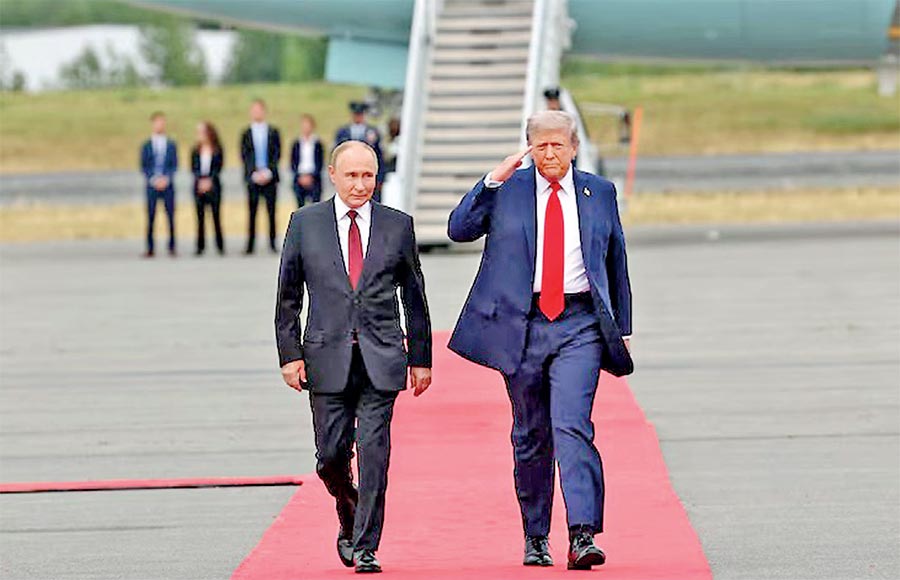
Trump-Putin Alaska summit
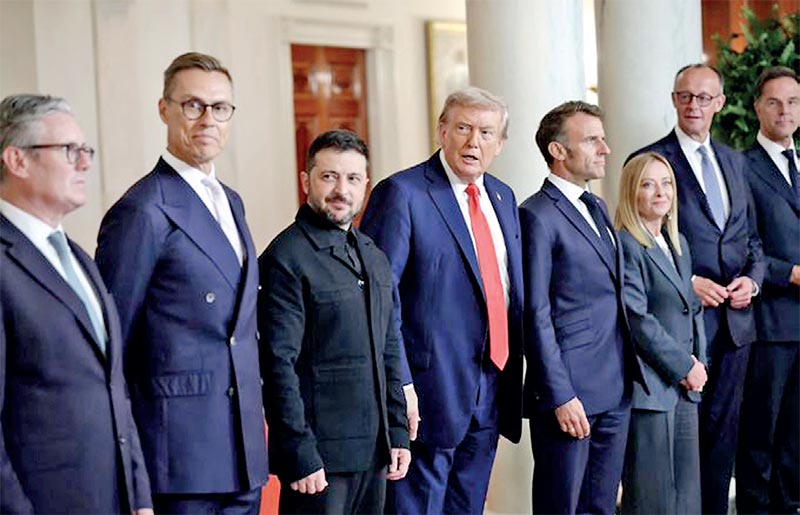
Trump, Zelensky, UK and EU leaders
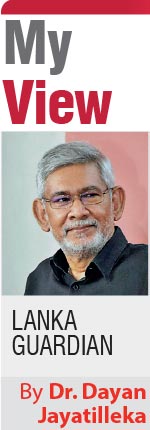 Sri Lanka faces the Report of the Office of the United Nations High Commissioner on Human Rights (OHCHR), and the Resolution expected to be submitted by the UK and Canada at the September session of the UN Human Rights Council, in a specific global and historical context. That context is the confusion, fissure, irrationality and extremism in the West, and the resultant toxicity of the West.
Sri Lanka faces the Report of the Office of the United Nations High Commissioner on Human Rights (OHCHR), and the Resolution expected to be submitted by the UK and Canada at the September session of the UN Human Rights Council, in a specific global and historical context. That context is the confusion, fissure, irrationality and extremism in the West, and the resultant toxicity of the West.
Most of the Human Rights initiatives, strictures and suggestions we face are from a West which is not merely divided but is showing increasing irrationality in different parts of the world and on different issues, displaying a deterioration in perception of and perspective on world events.
It is best evidenced in the schism on two major issues: (a) Russia/Ukraine and (b) Israel/Palestine. The USA or at least the Trump administration is rational on the former and irrational on the latter. The Rest of the West – UK, EU, Canada--is irrational on the former and rational on the latter.
In terms of political thought/theory and world outlook, the problem is that in the post-Cold War world, Liberalism and Realism have pulled apart or been pulled apart as paradigms.
Toxic West, UK-Canada resolution
The most significant thing about Alaska was not that it discussed Ukraine but that it was a bilateral summit between the world’s two nuclear superpowers at a time when the painstakingly negotiated framework of nuclear arms agreements has been dismantled, chiefly by the US Republican administration of George W Bush.
When there’s a conventional war in Ukraine with Russia and the UK-EU-NATO on opposite sides, it is vital for peace in Europe and the world that there be at least the beginning of restoration of normalcy between the two nuclear superpowers, USA and Russia. But this is far from self-evident in today’s West, including among US liberal-democrats.
The UK and EU viewed the entire process of the Trump-Putin meeting in Alaska exclusively through the prism of the Ukraine war. The continental/regional issue (Ukraine) is seen as greater than repairing the global architecture or even the resumption of dialogue between nuclear superpowers.
The UK-EU argument hypocritically leaves out NATO’s military devastation that ended an entire country, a state, in Europe, namely Yugoslavia in 1999.
Hypocrisy apart, there is historical amnesia. Despite the Cuban Missile Crisis, the invasions of Hungary and Czechoslovakia, the Vietnam War, the Yom Kippur war, summit meetings between the US and USSR, and between the US and China took place. They were seen as desirable in and of themselves. Relevant third parties either weren’t present (e.g. Cuba) or were approached later. US-USSR and US-China summitry took place before the Paris Peace Talks between the US and Vietnam. Superpower or Great Power summitry was seen as useful to the search for a peaceful solution in regional/local theatres. Not so today. Nuclear superpower summitry is seen by the UK-EU as a sellout. Russia is not even regarded as a superpower by the EU, which omits nuclear warheads as an indicator.
The fissure in the West sees the moral pendulum swinging in the opposite direction in the case of Israel/Palestine. France, Canada, the EU, Australia et al, who are hawkish on Russia/Ukraine, are comparatively moderate on Gaza and the Palestine issue, while the USA stands isolated even in the UN, in its staunch defence of Israel’s hideous policies and practices. This despite the fact that two American citizens of Palestinian origin have been killed by Jewish settlers in the West Bank and a retired Colonel of the US Green Berets has gone on the record about intentional killings in Gaza of unarmed Palestinian civilians searching for food at GHF distribution points.
With the West fissured, and with both halves displaying a serious dissonance of collective cognition and ethics, Sri Lanka must be exceedingly wary of falling in line with Western initiatives especially in our national policy on sensitive issues such as postwar accountability.
The dangerous flaws in the thinking and moral-ethical practices of the collective West lends little credibility to its diagnoses and prescriptions concerning us in the global South, and Asia in particular. This is most especially so in matters regarding complex questions of contemporary history such as Sri Lanka’s Thirty Years War.
While Britain has yet to set us an example by showing some accountability about Bloody Sunday in Londonderry 1972, the Canadian Parliament which unanimously passed a resolution accusing us of genocide, can hardly be expected to possess any kind of objectivity when co-sponsoring a resolution on Sri Lanka.
OHCHR Report’s truth bomb
This is not to say that we shouldn’t pay careful attention to the OHCHR Report, still less that we should dismiss it out of hand. The OHCHR Reports are of considerably high technical quality—and therefore contain much useful, even very insightful material. So, it is with Volker Türk’s latest Report.
I draw attention to three aspects of the Report.
 Disclosures concerning the reality of the socioeconomic crisis and the Government’s curiously inadequate efforts.
Disclosures concerning the reality of the socioeconomic crisis and the Government’s curiously inadequate efforts.
 The promises made by the NPP Government to the UN Human Rights High Commissioner.
The promises made by the NPP Government to the UN Human Rights High Commissioner.
 Recommendations made by the High Commissioner.
Recommendations made by the High Commissioner.
On the socioeconomic front, the Volker Türk report reveals two fundamentally important realities.
Firstly, the grossly unsatisfactory, inadequate terms that Anura’s JVP-NPP Government has been able or willing to secure concerning debt restructuring and repayment from the private foreign creditors (the ISB holders)—terms which fall far short of UN recommendations.
Secondly, the present state of socioeconomic deprivation and its worsening; the unprecedented suffering of increasing numbers of citizens.
The OHCHR Report drops a ‘truth-bomb’:
“In December 2024, Sri Lanka concluded a debt restructuring process; private bondholders fell short in terms of the principle of shared responsibility underscored in the United Nations Guiding Principles on foreign debt and human rights, accepting a modest quantum of under 10 per cent in so-called “haircuts” on their holdings. Sri Lanka is expected to face a heavy external debt repayment burden over the next decade.”
(Point 13, Section A, Human Rights Impact of the Economic Crisis and Corruption. https://www.ohchr.org/en/documents/reports/ahrc6021-situation-human-rights-sri-lanka-comprehensive-report-united-nations)
This means the Sri Lankan government delegation did not try to, or wish to or wasn’t able to negotiate hard enough to ensure that the private bondholders adhered at least to the minimum standards contained in the UN Guiding Principles on Foreign Debt and Human Rights.
The OHCHR Report criticises the private bondholders for ‘accepting a modest quantum of under 10 per cent in so-called “haircuts”…’ This means the AKD Government was only able to obtain a miserable haircut not even amounting to 10%.
One possibility is that the government tried and failed, but there is no such news. On the contrary, President AKD has repeatedly boasted in Parliament about the deal he signed on debt restructuring with both the IMF and the private bondholders. Thus, one must logically conclude that he didn’t try to push for a better ‘haircut’ --because if he did, he would have said in parliament that he tried his very best but the other side was too obdurate.
But then again, why would a Sri Lankan Government delegation which included the President’s Senior Economic Advisor Duminda Hulangamuwa who is also the Chairman of the Ceylon Chamber of Commerce which contains private bondholders, fight hard or even be motivated to secure a substantive haircut rather than settle for a marginal percentage of under 10%? The smaller the haircut, the bigger the bondholders’ take.
Why would President AKD ignore the obvious conflict of interest involved in the negotiation for a haircut on the private foreign debt which is at the heart of Sri Lanka’s debt crisis?
When a very sympathetic Prof Martin Guzman visited Sri Lanka together with Prof Jayati Ghosh, he disclosed that as Argentina’s Finance Minister he had secured a haircut of 50% on his country’s debt. Guzman and Ghosh had a pre-election discussion and photo session with the JVP-NPP leaders at Pelawatte. Why didn’t President AKD enlist him as an advisor in the negotiations?
The AKD Government would have benefited politico-electorally from a substantive haircut on the debt, which would have meant far less constriction on its economic and development options. Strangely it didn’t fight for one. Why? Since the private foreign bondholders were major beneficiaries of the most pathetic (under 10%) of haircuts—much more a token ‘trim’ than a ‘haircut’-- one cannot but ask the question: Cui Bono? Who benefited or continues to benefit? Under a successor administration a Special Presidential Commission should probe this.
The OHCHR Report shows that the result of the failure to negotiate a reasonable ‘haircut’ is that “Sri Lanka is expected to face a heavy external debt repayment burden over the next decade.” Contrary to AKD’s self-congratulation in Parliament, his debt-restructuring/repayment performance is no cause for optimism still less applause.
A news report titled ‘Half of SL households eating less’ in our sister paper summarizes the social consequences.
 ‘People skip meals, eat less preferred food or reduce portion sizes
‘People skip meals, eat less preferred food or reduce portion sizes
 Malnutrition in children under five increased from 12.2% to 17%
Malnutrition in children under five increased from 12.2% to 17%
 Poverty rate rose to 24.5% almost double 2019 levels
Poverty rate rose to 24.5% almost double 2019 levels
 Food prices more than doubled between 2021 and 2024
Food prices more than doubled between 2021 and 2024
…more than half of all households have turned to coping strategies such as skipping meals, eating less preferred food or limiting portion sizes, and over 27 per cent of households consumed inadequate diets, according to the report of the Office of the United Nations High Commissioner for Human Rights (OHCHR).
…The OHCHR says “the poverty rate in Sri Lanka was at 24.5 per cent, almost double the figure in 2019. Food prices more than doubled between 2021 and 2024. Despite macroeconomic recovery, employment and real wages remained below pre-crisis levels, resulting in elevated levels of poverty and food insecurity”.
According to the report in the 2025 budget, 8.9 per cent of the country’s Gross Domestic Product (GDP) or almost 60 per cent of Government revenue, was allocated to servicing interest payments on government debt…’
(https://www.dailymirror.lk/breaking-news/Half-of-SL-households-eating-less/108-316867)
The only way to exit the debt trap is to earn our way out by producing and exporting more while diversifying our export markets. But that is impossible to achieve under the AKD-NPP administration because a population—including the work force—that is forced to eat less, simply cannot produce more.
‘As well as the LTTE’
Volker Türk’s report betrays the rankest prejudice against the Sri Lankan State, its military and the nature of the civil war. The Report is biased in favour of the fascist-terrorist LTTE, which it lets off very lightly indeed. As far Volker Türk is concerned, the main perpetrators of crimes during wartime were the Sri Lankan military and the state. The LTTE were mere also-rans, worthy of only a passing mention.
This is what he says:
‘…Today, an opportunity presents itself for Sri Lanka to break from the past, with the leadership pledging a fresh direction on long-standing issues, including delivering justice to victims, restoring the rule of law, and eliminating discrimination and divisive politics. It now needs a comprehensive roadmap to translate these commitments into results,” said UN High Commissioner for Human Rights Volker Türk.
“This process should start with a clear and formal acknowledgment of the violations, abuses and crimes that occurred, including during the civil war, of the responsibility of the State and security forces personnel, as well as non-state armed groups such as the LTTE, and of the enduring impact of this violence on victims and communities. As I witnessed first-hand during my visit to Sri Lanka, the pain and suffering of victims remains palpable and their demands for truth and justice must be addressed.”…’
(https://www.ohchr.org/en/press-releases/2025/08/sri-lanka-has-opportunity-break-past-Türk)
So, according to Türk, “This process should start with…the responsibility of the State and security forces personnel, as well as non-state armed groups such as the LTTE…”
Even the Anura Kumara Cabinet should be able to grasp what is being said. The responsibility that should be clearly and formally acknowledged for the violations, abuses and crimes that occurred including during the civil war, is placed primarily on the State and security forces personnel.
The LTTE is swept under the rug of “non-state armed groups such as the LTTE”. According to Volker Türk’s understanding, the State and the military are primarily responsible for the crimes. The LTTE is not acknowledged or perceived as the secessionist, totalitarian, terrorist organisation that the State had the responsibility to defeat, especially since it had an army, a navy and air-force of sorts, and had re-initiated war every time the Sri Lankan state had entered into negotiation. The Tigers who exploded more suicide bombs than all the Islamist groups put together (according to Prof Robert Pape), and assassinated on Indian soil, Jawaharlal Nehru’s grandson not to mention Sri Lankan leaders and a foreign minister, are only secondarily responsible (if that), and are ‘included’ under the rubric of ‘non-state armed groups’.
Independent Prosecutor’s Office
The OHCHR Report welcomes “the Government’s initiative to establish an independent Public Prosecution office…” What is the logic of establishing a new office of that definition and description? What and who is it ‘independent’ of? What will or can the ‘independent Public Prosecution office’ do, which the existing Attorney-General’s Department cannot or does not? How will the public prosecutor’s office be more ‘independent’ than the A-G’s Department? Is it through inclusion of foreigners in the prosecution of the Sri Lankan military personnel who fought the war?
Volker Türk’s Report recommends that Sri Lanka signs the Rome Statute of the International Criminal Court. (President Kumaratunga, not PM Ranil, rightly declined to do so). I respect the ICC as a valuable international institution, but in Sri Lanka’s case, given the revenge-seeking Tamil Diaspora lynch-mob with its considerable electoral influence in the West, it will mean Sri Lanka entering a game played with heavily-loaded dice.
Zionism in North and East
AKD hasn’t lifted a finger to stop visa-free access, regulate Israeli establishments and aggressive behaviour, or prevent entrepreneurial expansion by local proxy. What will result? Read the Delhi-based Israeli ambassador’s interview:
“…Indeed, there are certain intellectual and cultural affinities between the Jewish people and the Jaffna Tamil community that are both striking and deeply admirable.
Both communities have demonstrated remarkable resilience in the face of adversity, a strong emphasis on education as a means of empowerment, and a long-standing tradition of excellence in fields such as medicine, law, engineering, and academia. These shared values - of perseverance, learning, and contribution to society - create a natural sense of mutual respect.
…In regions like the Northern and Eastern provinces, where climate vulnerability and water scarcity affect agricultural productivity, Israeli technologies can help maximize output with minimal water use, improve soil health, and reduce dependency on unpredictable rainfall. Some of this work is already done by Israeli private sector companies represented by local agents…”
(https://www.jaffnamonitor.com/featured/jews-and-jaffna-tamils-share-intellectual-and-cultural-bonds-israeli-envoy-pledges-israels-support-for-sri-lankas-economic-recovery-and-sustainable-growth/)
The danger in AKD’s Open Door policy for Israelis is a probable axis between Tamil ultranationalism and Zionist expansionism in the island’s North and East.
[This columnist was Ambassador/Permanent Representative to the United Nations, Geneva 2007-2009; Vice-President, UN Human Rights Council 2007-2008.]